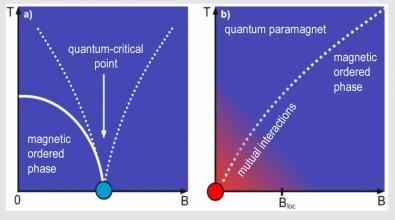Scientists found that in actual materials, there’s no such thing as a critical point at which a quantum phase transition occurs in a genuine zero field because of the persistence of the residual magnetic field created by the many-body interaction

Credit: UNESP
Classical phase transitions are governed by temperature. One of the most familiar examples is the phase transitions of water from solid to liquid to gas. However, other parameters govern phase transitions when temperatures approach absolute zero, including pressure, the magnetic field, and doping, which introduce disorder into the molecular structure of a material.
This topic is treated from the theoretical standpoint in the article “Unveiling the physics of the mutual interactions in paramagnets “, published in Scientific Reports, an online journal owned by Springer Nature.
The paper resulted from discussions held in the laboratory in the context of the doctoral research of the two main authors, Lucas Squillante and Isys Mello, supervised by the last author, Mariano de Souza , a professor in the Physics Department of São Paulo State University’s Institute of Geosciences and Exact Sciences (IGCE-UNESP) in Rio Claro, Brazil.
The other coauthors are Roberto Eugenio Lagos Mônaco and Antonio Carlos Seridonio , also professors at UNESP, and Harry Eugene Stanley , a professor at Boston University (USA).
The study was supported by São Paulo Research Foundation – FAPESP via a grant awarded to the project “Exploring thermodynamic and transport properties of strongly correlated electron systems”, for which Souza was the principal investigator.
“In paramagnetic materials, there’s always a subtle many-body contribution to the system’s energy. This contribution can be considered a small effective local magnetic field. It’s usually overlooked, given the very small amount of energy associated with it compared to the energy associated with thermal fluctuations or external magnetic fields.
Nevertheless, when the temperature and external magnetic field approach zero, such many-body contributions become significant,” Souza told.
The study showed that matter always tends to be ordered at low temperatures owing to many-body interactions. The noninteracting spin gas model therefore does not occur in the real world because a many-body interaction between the spins in the system would impose order.
“We found that in actual materials, there’s no such thing as a critical point at which a quantum phase transition occurs in a genuine zero field because of the persistence of the residual magnetic field created by the many-body interaction. In a broader context, ideal Bose-Einstein condensation can’t be obtained because of this interaction,” Souza said.
A Bose-Einstein condensate, often referred to as the “fifth state of matter” (the others being solid, liquid, gas and plasma), is a group of atoms cooled to within a hair of absolute zero. When they reach that temperature, the atoms have no free energy to move relative to each other and fall into the same quantum states, behaving as a single particle.
Bose-Einstein condensates were first predicted and calculated theoretically by Satyendra Nath Bose (1894-1974) and Albert Einstein (1879-1955) in 1924, but it was not until 1995 that Eric A. Cornell, Carl E. Wieman and Wolfgang Ketterle managed to make one using ultracold rubidium gas, for which all three were awarded the 2001 Nobel Prize in Physics.
“What our study showed was that although a nonideal Bose-Einstein condensate can be obtained experimentally, the ideal condition for condensation can’t be achieved because it presupposes that particles don’t perceive or interact with each other, whereas residual interaction always occurs, even in the vicinity of absolute zero,” Souza said.
“Another discovery was that matter can be magnetized adiabatically [without heat loss or gain] via these mutual interactions alone.”
###
About São Paulo Research Foundation (FAPESP)
The São Paulo Research Foundation (FAPESP) is a public institution with the mission of supporting scientific research in all fields of knowledge by awarding scholarships, fellowships and grants to investigators linked with higher education and research institutions in the State of São Paulo, Brazil. FAPESP is aware that the very best research can only be done by working with the best researchers internationally. Therefore, it has established partnerships with funding agencies, higher education, private companies, and research organizations in other countries known for the quality of their research and has been encouraging scientists funded by its grants to further develop their international collaboration. You can learn more about FAPESP at http://www.
Media Contact
Heloisa Reinert
[email protected]
Original Source
https:/
Related Journal Article
http://dx.




